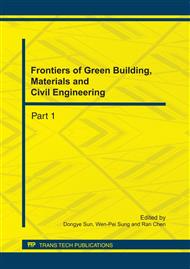p.476
p.480
p.484
p.490
p.494
p.498
p.506
p.510
p.514
Construction Research of Indoor Environment Intelligent Control System Based on MAS
Abstract:
Strictly speaking, the indoor environment intelligent control system can not only detect the parameters of indoor environment, the state of every equipment, but also adjust indoor environment automatically in order to achieve the most comfortable indoor environment under condition of saving energy. Based on thermal comfort index PMV, we have constructed the MAS (Multi-Agent System) for indoor environment control with Zigbee network technology after the deeply research on the decoupling of the environment parameters. In this paper, main researching contents have been discussed like the cooperation strategy in the MAS, proposed a cooperation strategy based on the task distribution, which decreased the communication and enhanced problem solving efficiency.
Info:
Periodical:
Pages:
494-497
DOI:
Citation:
Online since:
July 2011
Authors:
Keywords:
Price:
Сopyright:
© 2011 Trans Tech Publications Ltd. All Rights Reserved
Share:
Citation:


